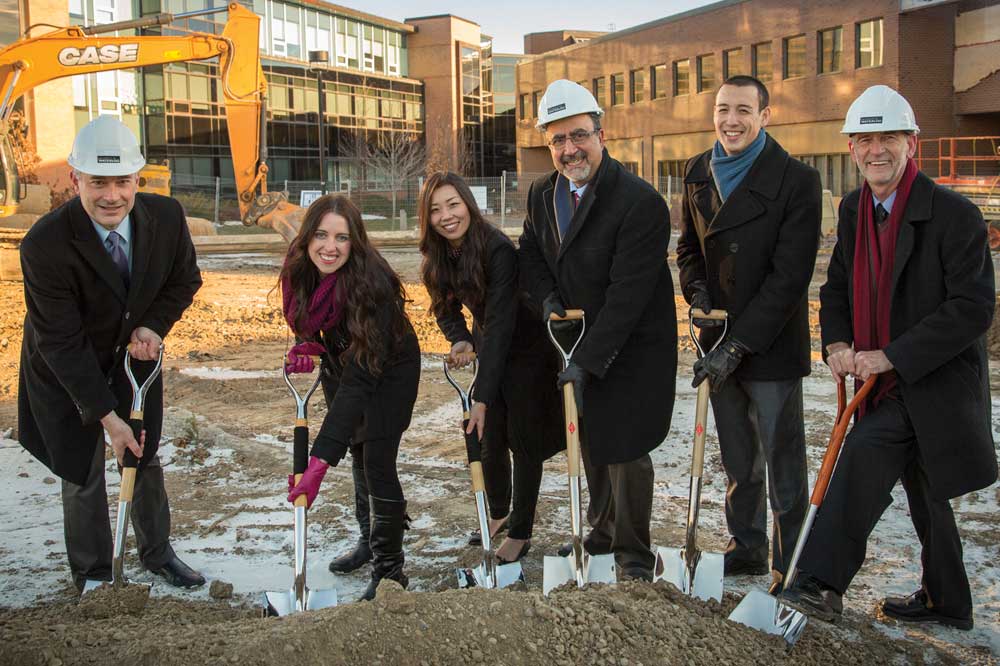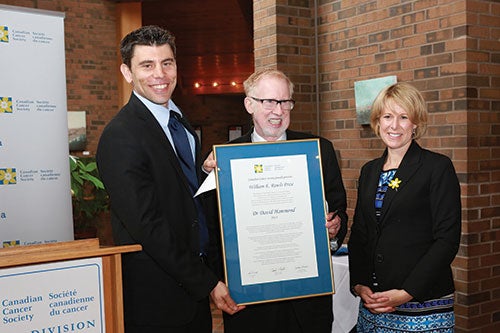
Quick links:
Strategic Initiatives: Transformational Research
- In February, AHS formally launched the Network for Aging Research (NAR), a strategic and essential step toward advancing aging research at the University of Waterloo and beyond. Under the leadership of Professor Steven Mock of the Department of Recreation and Leisure Studies, the Network has already reached several milestones including:
- Establishment of a steering committee with campus-wide representation;
- Identification of and consultation with 65 investigators who are conducting aging-related research at the University;
- Launch of a NAR website to provide information and enhance communication and collaboration among researchers regarding aging research opportunities;
- Presentation of a public lecture by the Director of the Cornell Institute for Translational Research on Aging; and
- Development of a mentorship seed grant program that pairs junior investigators with more senior colleagues to conduct new, highly-focused, collaborative research initiatives in aging. The inaugural program selected and presented eight teams of researchers with $10K each.
- Renovations of the North Campus Tech Town building created new space for the Propel Centre for Population Health Impact and researchers in the Department of Kinesiology.
- The Tech Town building will also house the Advanced Aging ResearCH Centre (ARCH), a pioneering facility set to bring researchers from across disciplines together to develop personalized approaches to health care aimed at changing the course of aging. The Canada Foundation for Innovation awarded ARCH $1.3M for a variety of diagnostic and measurement tools, setting it up to be the most comprehensive collection of equipment focused on aging in the country. Significant partner funding is expected to triple the scope of the project in the coming year.
- Kinesiology Professor Clark Dickerson was awarded a new Natural Sciences and Engineering Research Council (NSERC) sponsored Canada Research Chair in Shoulder Mechanics.
- From nutrition in older adults to metabolic adaptations of diabetes, this year AHS investigators advanced their research programs with:
- $2.5M in grants from the Canadian Institutes of Health Research, including $320K awarded to Professor Steve Manske, of the Propel Centre for Population Health Impact, for the Cancer Risk Assessment in Youth Survey; and
- More than $1M in funding from the NSERC, including a 100% funding success rate on research tools and equipment grant applications.

The Canadian Cancer Society presented Professor David Hammond of the School of Public Health and Health Systems with its Award for Excellence in Cancer Research for his pioneering work in cancer prevention.
- Professor Paul Stolee, of the School of Public Health and Health Systems (SPHHS), is overseeing three projects for AGE - WELL, a new Networks of Centres of Excellence that received $36.6M in funding from the Government of Canada to create and evaluate technology to benefit older adults. As part of this grant, SPHHS Professors John Hirdes and Joon Lee are leading projects that leverage recent advances in mobile devices, sensor technology, cloud computing and Big Data analytics to empower older adults and their caregivers.
- Completed construction on the Schlegel-UW Research Institute for Aging (RIA) Centre of Excellence for Innovation in Aging, a one-of-a kind facility where Waterloo researchers, including AHS’ Schlegel Research Chairs, will collaborate with long-term care residents and partners from Conestoga College and Schlegel Villages to lead innovations in aging-related issues ranging from brain health and nutrition to coordinated health care delivery.
- Provincial police across Ontario are using a screening tool developed by School of Public Health and Health Systems researchers to assess mental-health issues and improve transitions from police custody to hospital care.
- The Partnerships in Dementia Care Alliance (PiDC), led by Professor Sherry Dupuis in Recreation and Leisure Studies and collaborators, is working with residents of long-term care facilities, staff, family members, and other care providers in changing the culture of long-term care toward bi-directional relationships in planning and decision-making. The alliance produced a new research-based drama, Cracked: New Light on Dementia, to raise questions about many of the dehumanizing practices that still prevail in care settings and give family members and support staff better ways to interact with persons living with the disease.
- Kinesiology Professor Lora Giangregorio developed multicomponent exercise recommendations for Osteoporosis Canada to help reduce falls and resulting fractures for people living with osteoporosis.
- The Faculty’s Centre for Research Expertise in Musculoskeletal Disorders (CRE-MSD), which performs research and engages in workplace stakeholder knowledge transfer, hosted over 400 cross-sector delegates at conferences to address issues ranging from the impact of the aging workforce on employers to operationalized MSD prevention.
- The Chronic Disease Prevention Initiative led by the Propel Centre for Population Health Impact launched a series of new seed grant competitions, which led to the development of an additional 15 multi-disciplinary research teams on campus - bringing the total number of teams created over two years to 35.
- The Faculty broke ground for the AHS expansion building, a 56,000 square foot facility set to house the School of Anatomy, a 350-seat lecture theatre, state-of-the-art research and teaching laboratories, and collaborative work spaces for students. This facility will enhance capacity for transformative health research and academic programming.
Strategic Initiatives: Academic Programming
- Canada’s first professional online, course-based graduate degree in health evaluation, the Master of Health Evaluation, accepted its first cohort of 21 students in 2015.
- The Department of Kinesiology created an on-campus, course-based stream in its Master of Science program, admitting the first cohort in fall 2015.

- In collaboration with St. Paul’s GreenHouse, AHS launched a social innovation initiative, the Big Ideas Challenge for Health and Wellbeing, to encourage undergraduate students to develop interventions with the goal of improving the quality of life of individuals or communities. Four students won space in GreenHouse’s accelerator residence for their ideas.
- As a commitment to quality and continuity in academic programming, AHS welcomed five new permanent continuing lecturers to the faculty complement.
- Teaching Fellow Kelly Anthony established an award to honour excellence in teaching in the Faculty. Luke Potwarka, of the Department of Recreation and Leisure Studies, won the inaugural award for his meaningful and engaging classroom experiences that challenge students to think critically about their world.
- The Faculty approved the creation of a new staff position to focus on enhancing graduate recruitment.
- To ensure foundational outcomes in writing and communication skills for first-year students, AHS created a course designed to develop a broad understanding of how activity, health and well-being are influenced by a variety of changes in society. The course is intended as a dynamic cohort experience for all AHS students regardless of program and will provide the theoretical foundation to make connections between the classroom and professional and community settings.
- The Recreation and Leisure Studies curriculum is undergoing a redesign with the new curriculum set to launch in fall 2016. The new curriculum will include significant experiential learning and community interaction components.
- The AHS Teaching Champion Team won a 2014-2015 LITE grant to identify the barriers and facilitators to high-impact teaching in the Faculty.